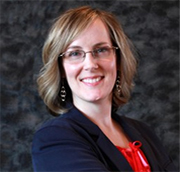by Jennifer Hackbarth
Our bodies work hard to maintain homeostasis, a state when all bodily systems are functioning in balance. No matter the temperature of our environment, our internal body temperature needs to stay within a fairly narrow range; if it goes too high or too low, we can get sick and even die. We are biologically predisposed to resist change, for better or for worse. Maintaining a stable body temperature or blood glucose level promotes overall health. Yet positive changes may also be a struggle, such as recovering from an addiction or starting an exercise habit. Our physiological and emotional selves like to stay comfortable.
The tendency to maintain homeostasis also extends to families and communities. For better or worse, we lean toward choices that avoid systemic changes; when they happen, we struggle to adjust. I find comfort in knowing discomfort is a natural biological response. Our bodies tell us avoiding change is a matter of survival. We can expect that the work of transitioning after a change will be hard.
My oldest child will be a senior in high school this fall. Our family will live in the in-between this school year, between what has been and what will be in the future. It will be a year of lasts—last concerts, last report cards, last games, the last first day of school. Next spring, there will be no turning back as graduation approaches and plans are solidified for the following year. I’m already overwhelmed at the thought of adjusting to the changes graduation will bring. I feel like an open nerve, my protective covering gone and my emotions exposed to the elements. I know this change is necessary, yet that doesn’t make it easier. I like having my son tucked into his bed in our basement each night and sitting at the dinner table each day. There is comfort in keeping things the same. Even the anticipation of change is difficult.
Transitions always begin with an ending. There is death before there is life. You can’t get to the resurrection without going through the cross. Jesus says in Mark chapter 8, “For those who want to save their life will lose it, and those who lose their life for my sake, and for the sake of the gospel, will save it.” In her book How to Lead When You Don’t Know Where You’re Going, Susan Beaumont translates this verse as “We lose ourselves in order to find ourselves.”
Transition is spiritual work. Opening ourselves up to the Spirit’s movement is risky, and we often resist the Spirit or introduce change when the Spirit asks us to sit still. We get caught in our own egos and forget to listen to the Spirit’s guidance.
I like to think of the Spirit as a cool breeze on a hot day, and at times it brings relief. Yet the Spirit’s movement may also feel like a death, prying open our hands when we’ve gripped something too tightly, upsetting our balance and leaving us disoriented and untethered. At times the Spirit leads us to tenderness and vulnerability, leaving us perplexed and in a daze. Only then may we lose ourselves in order to find ourselves.
The apostle Paul writes in Romans 6, “We were buried with Christ through baptism into death, so that, just as Christ was raised from the dead through the glory of the Father, so we too might walk in newness of life.”
We are called in baptism to a cruciform life, dying each day to our old selves and rising with Christ. Life is full of “little deaths,” including the deaths of our egos, our expectations, and our need to be in charge, impress others, and stay comfortable. When we’re focused on surviving, what are we missing?
During the laying on of hands in the baptism service, we thank God for the gifts of baptism. We pray for sustenance through the gifts of the Holy Spirit (Isaiah 11:2): the spirit of wisdom and understanding, the spirit of counsel and might, the spirit of knowledge and the fear of the Lord, the spirit of joy in your presence, both now and forever. Nowhere in baptism do we pray for survival, sameness, or comfort. Instead, we welcome wisdom, might, fear, and joy in the Spirit’s presence.
There is peace in letting go. I don’t know what the next year will bring in my household, but I predict there will be a sense of unmooring as we shift into another stage of life. There is and will be a lot of unknowing. It will also be a year of promise and excitement as new opportunities present themselves. In my good moments, I hope to be curious about what’s next and find delight in the changes; in my difficult moments, I hope to remember it’s human to struggle with letting go and to sense the presence of the Spirit with me.
Discussion Questions:
1. What was a difficult time of change in your life? What made it difficult?
2. What helps you move forward in times of transition?
3. Have you ever had to lose yourself in order to find yourself? Describe what it was like.
Closing Prayer:
God of New Life, give us courage as we face changes in our lives. Bless us with wisdom and the gift of joy in your presence. Thank you for each new day and the opportunities it presents. In Christ, we pray. Amen.
 Jennifer Hackbarth is the pastor of Christ the King Lutheran Church in White Bear Lake, Minn. She enjoys cooking, reading, travel and spending time with her husband and two kids. You may find her reflections on faith and daily life at www.narratinggrace.wordpress.com.
Jennifer Hackbarth is the pastor of Christ the King Lutheran Church in White Bear Lake, Minn. She enjoys cooking, reading, travel and spending time with her husband and two kids. You may find her reflections on faith and daily life at www.narratinggrace.wordpress.com.

